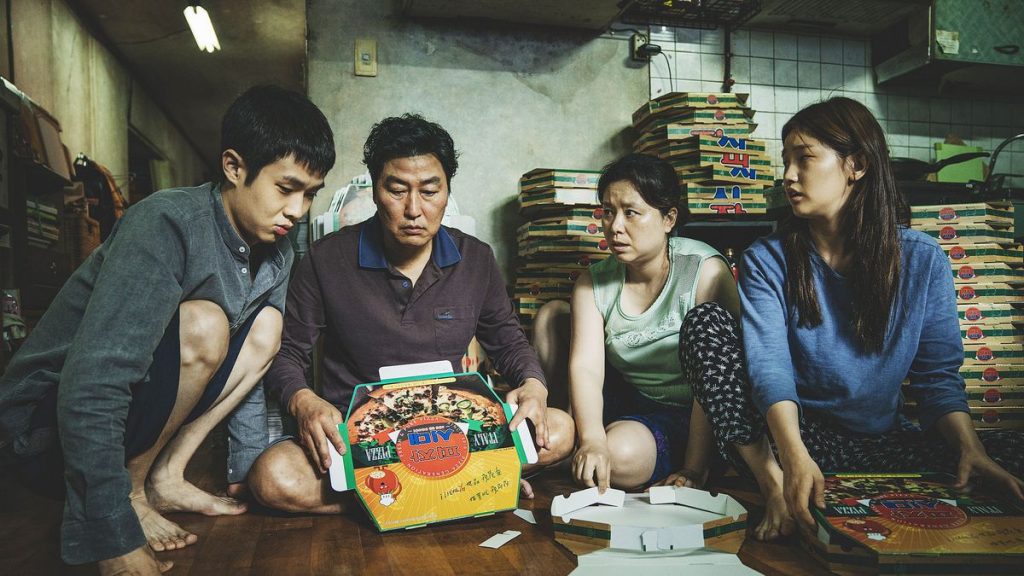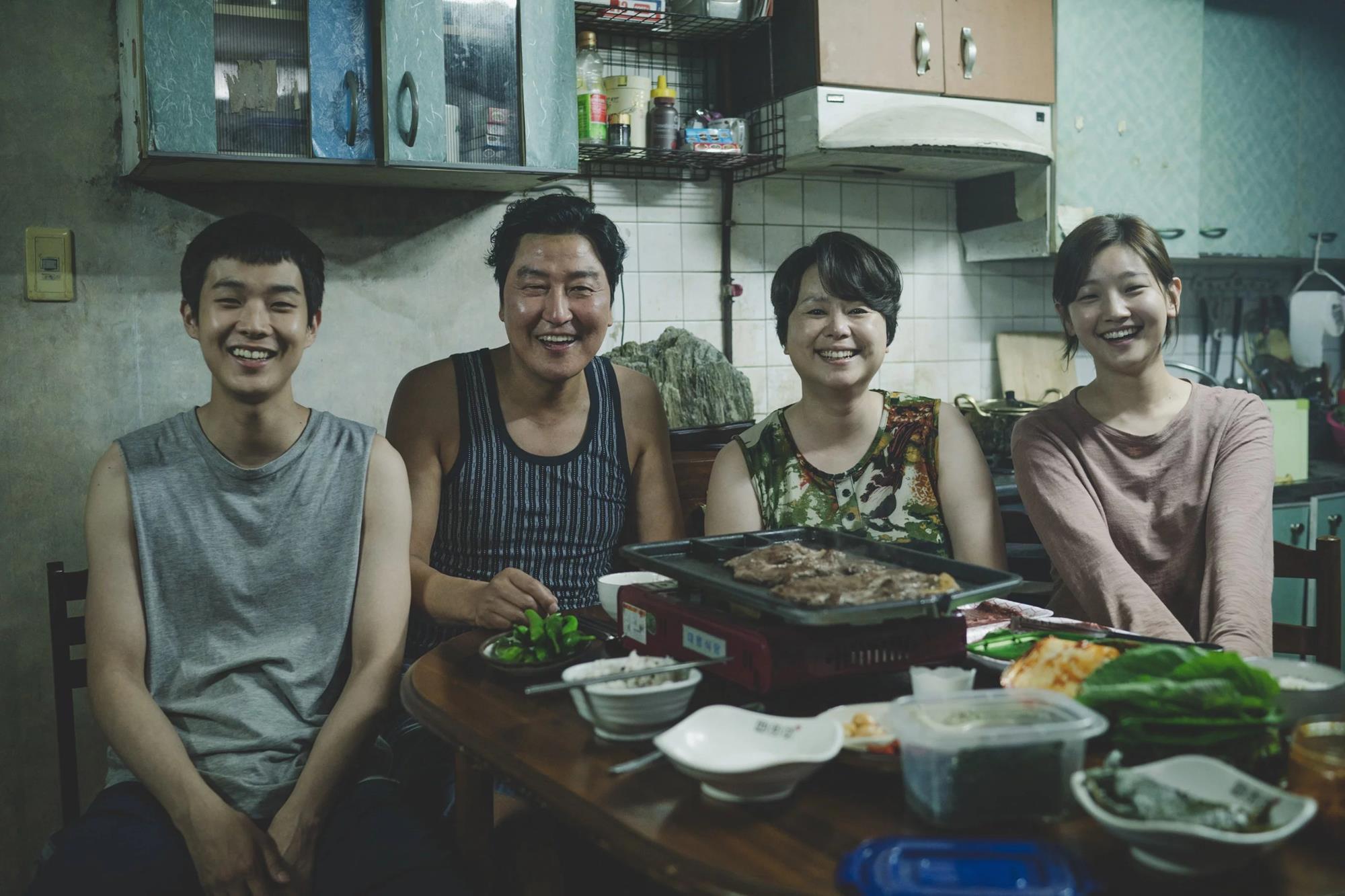South Korean film savant Bong Joon-ho recently crushed one into the homefield stands with the release of the movie Parasite, after a number of brilliant internationally acclaimed entries. Bong Joon-ho’s addition of Parasite to his oeuvre (which includes Snowpiercer!!) shows just what kind of a cinema giant he is. And finally, for the very first time, 2019 Cannes has given the acclaimed Palme d’Or – literally the top film prize the world over – to a Korean film. But trophies and acclaim mean nothing to this film, because I promise you, Bong Joon-ho and his Korean movie Parasite is a picture in class warfare, and this film has its sights set on something else entirely.
(Time travel edit… congratulations Parasite for your Oscar win as the first foreign film to win best picture. You deserve it.)
With Parasite, Joon-ho has pointed his sniper rifle right at the heart of class warfare around the world. Originally I assumed this was a commentary on the class warfare in Korea, but Joon-ho has definitely given the rest of the world something to think about even if we’d rather not. But what is this crazy Korean film about already? It’s about a very poor family insinuating themselves into the lives of the truly extravagantly rich. The movie comes off more as a humorous morality tale at first, with laughable coincidences, and silly screenplay contrivances. But Joon-ho definitely uses these forced screenplay situations in order to make a bigger point as the movie heads into the homestretch where he totally throws everything upside down.
If you haven’t seen it yet – which, would be difficult, seeing as though it doesn’t come out until October 11th. Regardless, do not spoil this movie by continuing to read below – put it in your to-do lists for a month from now. (Here, try this on for size – say this out loud: “Siri – remind me on October 11th to go find the movie Parasite!” Yes, you are right, that is amazing. And yes, that was free of charge. That’s just the kind of benevolent friend I am.)
Parasite Movie Walkthrough
A very poor family headed by father Kim Ki-taek (Song Kang-ho), mother Choong-sook (Jang Hye-jin), son Ki-woo (Choi Woo-shik) and daughter Ki-jeong (Park So-Dam) live in utter poverty in the bowels of Seoul. The entire family is struggling to make it by working on assembling pizza boxes, and other low paying jobs. But when Ki-woo’s friend Min-hyuk heads off to study abroad, he hands his English student he had been tutoring to him. Something about not wanting his buddies to hit on her or something.
Long story short, Ki-woo, after insinuating himself into the extraordinary Park mansion, and after he begins teaching Da-hye, gets the idea to weazle his entire family into the house, one by one. (I found this bit the most trying part of the screenplay.) Soon Ki-woo recommends a professional art therapist who goes by the name Jessica (really is his sister Ki-jeong) to mentor the Parks’ youngest child, Park Da-song. Then it was the driver that Ki-jeong gets fired by leaving her panties in the back of the car. And then after dad is employed as the driver, the next stop is getting mom in as the housekeeper. Got that? Voila, presto-chango…the Kims are into the Parks’ residence.
Soon after, the Parks leave for their son’s birthday. And while they are gone, the Kim’s take up residence, drinking, and partying. But soon, Moon-kwang (the old housekeeper) arrives at the front door asking to come in and get something. Turns out – she’s wanting to get her husband, Geun-sae (Park Myung-hoon), who has been hiding in the house for the last four years because of loan sharks that are out to get him. So the Kims have Moon-kwang cornered, right? But then the Kims fall into plain view and crash to the floor (straight out of a Laurel and Hardy bit…possibly the worst writing of the movie.) And now Moon-kwang has video of them referring to each other as father, sister, etc. But in the middle of their fight, the phone rings and they all learn that – of course – the Parks are on their way home because of the horrible rain.

Insert near miss, after near miss, and at the end of it all, Moon-kwang has a horrible wound to the head. And her husband is bound and gagged. A little while later, Ki-woo, Ki-taek, and Ki-jeong all sneak out of the house only to find that their house has been destroyed by the floods. Ki-woo saves their “lucky rock” that was given to the family by his friend’s family (which was apparently what had turned around their “luck”) and he intends to go back and bash Geun-sae’s head in with it. Meanwhile Moon-kwang dies of her head injuries.
The next day – Mrs. Park throws her son an “impromptu” party since his camping trip was destroyed by the rain. So Ki-woo goes with the rock into the basement (after waxing eloquent about whether or not he belongs at an “impromptu” or not) but is ambushed by Geun-sae, and cracks Ki-woo’s head instead with the rock. Then Geun-sae stabs Ki-jeong in the chest with a knife as he heads out into the party. His arrival causes Da-song to remember a similar incident years before, which sends him into shock, and causes a seizure. In the ensuing melee, the car keys get trapped under Choong-sook – the mother – as she is killing Geun-sae with a meat cleaver or something. As Mr. Park is going to retrieve the keys, Ki-taek snaps and murders Mr. Park by stabbing him to death.
The ending is all narrated from Ki-woo’s post surgery standpoint a few weeks later. Both Ki-woo and Choong-sook, his mother, face trial and are given probation. Ki-jeong, Ki-woo’s sister, died from her injuries inflicted by Geun-sae. While watching the Park’s house, Ki-woo sees the flickering Morse code, and realizes it’s a note left from his father who hid in the bunker during the resulting chaos. Ki-woo makes a promise that one day he will have enough money to purchase the house in order that his father can be free. But that is when Ki-woo wakes from a dream in which he purchased the house and the father, mother and son, all reunite happily! But that didn’t actually happen, “Take care until then, so long.”

Uh. Waht?!?
That was a lot of words. Basically the TLDR is that an extremely poor family wiggles their way into a rich family’s house under false pretenses. The rich family’s bigotry is outed, as they look down on their smell, and their general overall demeanor. But the rich family is stupid. And the poor family is street smart. And ultimately the poor family rises up and kills the rich family. But even after they do, the poor family is trapped in slavery of the basement of the rich family’s house…even long after they are dead and gone.
Does that maybe make more sense?
This movie is more like Snowpiercer than any other movie I’ve ever seen. You know, the movie about the train, where we start out in steerage – and the people revolt their way all the way to the front of the train? That movie? Similarly, the Kim’s revolt, and overthrow the ruling class that is subjecting them to menial tasks and treating them like they are stupid – when, in fact, it’s the rich elites that are the idiots in this scenario.
The movie is an unveiling of society’s biases and bigotries. It tells us that while the rich among us act benevolently, they are, in fact, the thumb holding us all down actively. Not only that, but we would be better off to rise up and overthrow them.
Moneyland
I recently read a book (skimmed might be a more accurate description) entitled Moneyland by Oliver Bullough. Bullough surmises that there is a world hidden from view from the rest of us that is purchased with extreme wealth. You know, that land where rich people feel comfortable buying their kids into college, and don’t give it a second thought. The land where the ultra-rich purchase homes via shadow corporations in order to hide the necessary taxes. It’s a land that extradites the rich from the various laws of the various lands around the world. A meta-land that is above governance and above accountability. Is that the land that the Parks come from?
But isn’t Parasite an indictment of the poor? They are the cockroaches after all! Who might “Parasites” that be referring to? Sure, maybe it’s the poor folks living in squalor, leaching the neighbors wi-fi. That seems to be the most obvious reading of the title. But who’s to say that the Park’s aren’t the ones leaching off of the Kims? Could it be that the title ‘Parasite’ isn’t generally an indictment of our upside down perspective of the rich? And who knows, maybe the movie is calling for an exterminator in order to send the rich running for the cover of darkness?!?
Stop though. Think about it. The Kims rise up. They overthrow the Parks. Ultimately, did anything change? Nah, the more it changes, the more it all stays the same. At the end of the film, the Kims are trying to figure out how to get their dad out of hock of the Park’s basement. Could he leave at any moment? Yes! But oh how the Kims are holding onto that toe hold they have on the Parks. Heck, the Parks went from one poor person imprisoned in their basement, to a different poor person imprisoned in their basement. The rich people on top changed, and the poor people in the basement changed, but even with the thrashing of the murders and the overthrow, we still have the poor on the bottom pining for the top. I mean, heck, Ki-woo’s plan to get his dad out consisted of, “make lots and lots of money and buy the house.” Hahahaha. Remind me again who the stupid one is here? Wow.

Final Thoughts on Parasite
Modern Asian movies like Forgotten, Bad Genius, Tag, Battle Royale, (I could keep going), tell these funny, quirky, socially awkward stories that are innocently naive in their acting – in a way – and yet are incredibly bloody. When your storytelling panache is this good – and your inventiveness is this out there, it’s as if you are demanding that the world stand up and notice you. They are eventually going to be forced to stand up and notice you. Snowpiercer, and Parasite’s larger moral, or larger societal messages are 100% dialed in for this day and age. And Parasite’s best picture win last night proves this. Parasite left me thinking about this movie long after the movie was over. Is it criticizing the rich? The poor? The system? Is it attacking the viewer for going along with this insanity blissfully? I really don’t know. But I love trying to grapple with it as I identify with the story of the movie all the same.
Was Parasite a morality play about underwater basket weaving? Or something? Thanks Ally for tipping us all off to this movie! Brilliant film.
Edited by: CY



